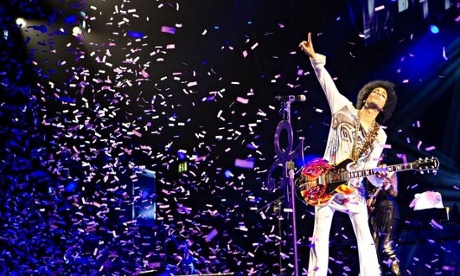
In early 1997, a heritage rock magazine took it upon itself to try to curate Prince’s recent work. Under the heading “The Crown Jewels”, it offered readers advice on how to fillet the albums he’d put out since 1988’s Lovesexy in order to make a great compilation cassette. The article suggested that what it called Prince’s “patchy period” was now at an end: he’d freed himself of the contract with Warner Brothers that had caused him to shove out inconsistent albums in a bid to fulfil his obligations to the label. With his attention once more on the music, a return to the astonishing artistic form he’d once displayed was surely imminent.
It’s an article that’s hard to read without allowing yourself a hollow chuckle. Two decades on, Prince’s patchy period is still in full swing. If he’s never made a truly awful album in the ensuing 17 years, the kind of unequivocal artistic triumphs of which his release schedule once solely consisted have been noticeable by their absence. In their place has come a familiar sound: that of journalists trying to will an unequivocal artistic triumph into existence on Prince’s behalf. It’s almost an art form in itself, which reached a kind of apotheosis – its Sign O’ the Times, its Parade – with Tony Parsons’ 2010 piece, in which he informed the world that the mediocre Prince album the Daily Mirror was giving away was both the most important comeback since Elvis climbed onstage in a leather suit and literally the best album ever made: “as good as anything that anyone has done”.
Which brings us to PlectrumElectrum and Art Official Age, on which Prince himself seems to join the chorus of voices insisting his new album, or rather albums, are an astonishing return to form. “Welcome home, class,” opens the latter, apparently addressing his patient fanbase, “you’ve come a long way.” The music that follows tells a slightly different story: a woolly, rambling assemblage of sounds – four-tot-the-floor house beat, dubstep-ish breakdown, dramatic strings, choral vocals, running-water sound effects, metallic guitar solo, honking air horns – in search of a decent song to attach themselves to. Rather than the fanfare to a glorious artistic renaissance, it sounds like an encapsulation of Prince’s big problem: not a lack of ideas, but a lack of focus, an inability, or unwillingness, to marshal his diverse talents and influences as strictly as he once did.
As with the best of his latter-day albums – Musicology, 3121 – what follows are flashes of brilliance interspersed with stuff that just wouldn’t have made the cut 30 years ago. There are fantastic songs here, among them the drum machine-driven, effects-laden electro-funk of Clouds, which comes complete with lyrics that simultaneously set up the album’s concept – a lot of guff about emerging from suspended animation 45 years in the future – complain about online file-hosting services and dole out romantic advice: “You can never underestimate the power of a kiss on the neck which she doesn’t expect.” There are moments when Prince sounds ready and able to take on R&B artists 30 years his junior at their own game. The drifting, disembodied U Know suggests he’s been listening to the Weeknd and Frank Ocean, but it feels less like a pastiche than a cocky demonstration of Prince’s ability to bend whatever musical style he chooses to his own ends. And there are brilliantly idiosyncratic production touches, not least on Breakdown, a ballad powered by the insistent boing of what appears to be a detuned bass guitar: it looks ridiculous on paper, but sounds incredible. But The Gold Standard’s attempt at taut, Black Album-style funk isn’t taut enough, This Could Be Us and What It Feels Like aren’t particularly interesting songs, while the lengthy Time stumbles between sounding idiosyncratic and a bit of a mess.
The accompanying PlectrumElectrum, recorded with current backing band 3rdEyeGirl, is more straightforward: as every review of their umpteen UK shows remarked, 3rdEyeGirl are an impressively tight funk-rock band, and their presence inspires Prince to some imposing soloing on the instrumental title track and at the conclusion of Anotherlove. The issue with PlectrumElectrum is the variable quality of the songwriting on offer. At one extreme, you get something like the gleefully punky Marz, or Whitecaps, a distinctive, characteristically off-kilter take on the current vogue for sunlit, mid-70s Fleetwood Mac-isms that makes you realise how boring a lot of current Fleetwood Mac-influenced pop is: a reminder to lesser artists that you’re supposed to take your source material and twist it into a different shape, not just do musical impressions. At the other, there’s the runny pop-reggae of Stopthistrain, a song so insubstantial it could end up in the Mail Online’s sidebar of shame, with a string of nameless “friends” claiming they’re “concerned” about its weight. Somewhere in between lurks most of the album, which isn’t bad, but always seems to be teetering on the brink of becoming more exciting than it actually is.
Prince’s apologists might point out that there’s a genuinely great album’s worth of material here, and they’d have a point: the best bits are worth sitting through the less fantastic bits for. It’s hard not to think that there was a time when Prince himself would have recognised that and scrupulously cut away the excess. For whatever reason, he now seems to require his fans to do that themselves. It’s infuriating, but the fact that it’s still worth doing at least tells you something about how good the highlights are.
- This article was amended on 30 September 2014: it original stated Prince’s Lovesexy album was released in 1989; in fact it was 1988.

